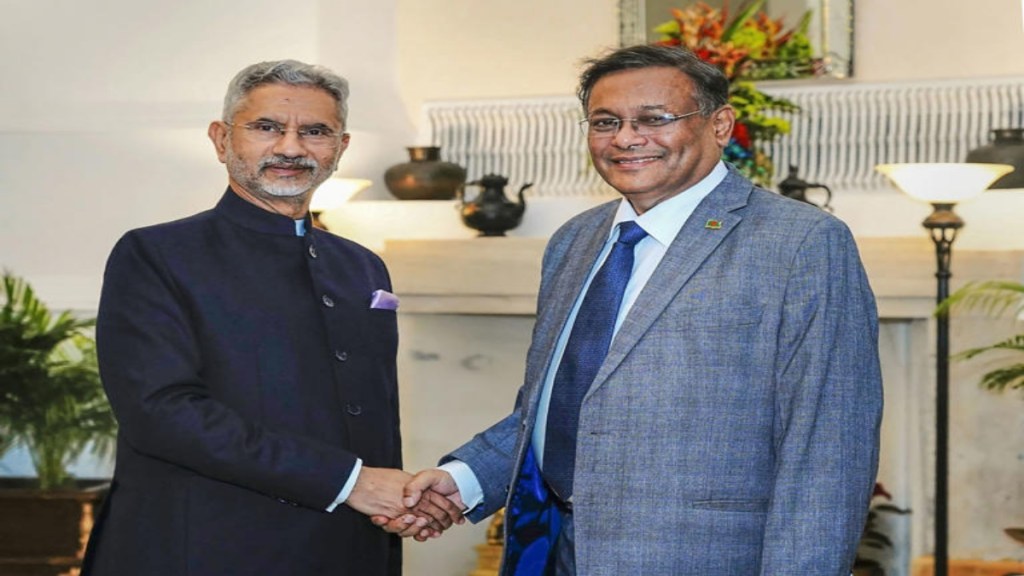India’s recent decision to reinforce its border with Myanmar has been commended by Bangladesh’s Foreign Minister Hasan Mahmud. The visiting minister highlighted the potential advantages of this strategy, particularly in addressing the issue of insurgency originating from Myanmar. And stressed the significance of regional stability and reiterated Dhaka’s unwavering commitment to combating terrorism, advocating for a “zero tolerance” policy.
During an interactive session at a prominent think-tank — Vivekananda International Foundation (VIF), Mahmud addressed the complexities posed by the presence of Rohingya refugees in Bangladesh. With an estimated 1.2 million Rohingya refugees currently in Bangladesh, he characterized their situation as challenging, citing environmental and security concerns. He appealed for India’s collaboration in facilitating their repatriation to Myanmar, emphasizing the necessity for a concerted effort to address this humanitarian crisis.
On elections in Bangladesh
Despite facing criticism, Mahmud defended the fairness of Bangladesh’s recent parliamentary elections, asserting them as the most vibrant and participatory in the country’s history. He acknowledged India’s support in ensuring free and fair elections, recalling New Delhi’s instrumental role in Bangladesh’s liberation from Pakistan in 1971.
Mahmud’s visit to India, his inaugural bilateral foreign trip since Prime Minister Sheikh Hasina’s re-election for a fifth term, underscores the significance of the India-Bangladesh relationship. He characterized the current state of bilateral ties as a “golden chapter,” highlighting the shared commitment to enhancing mutual trust, promoting connectivity, and fostering economic cooperation. He hailed the India-Bangladesh relationship as a model for the region and democracy, reflecting on the positive trajectory of their partnership.
Myanmar Situation
Discussing Myanmar’s situation, Mahmud expressed concern over ongoing developments, including widespread protests and armed conflict. He praised India’s decision to strengthen its border with Myanmar, citing potential benefits for both countries and the region. Mahmud emphasized the influx of refugees from Myanmar into India and Bangladesh, highlighting the necessity for concerted efforts to address the root causes of instability and displacement.
Rohingya Crisis
Regarding the Rohingya crisis, Mahmud reiterated Bangladesh’s longstanding efforts to engage with Myanmar for the repatriation of refugees with dignity and honour. Despite challenges and delays, he expressed optimism that the crisis could be resolved with cooperation from the international community, including India. Mahmud emphasized the importance of addressing the underlying issues driving the Rohingya exodus, including violence and persecution in Myanmar’s Rakhine state.
Myanmar has been witnessing wide-spread violent protests demanding restoration of democracy since the military seized power in the coup on February 1, 2021. Rakhine state and many other regions have reported severe fighting between armed ethnic groups and the Myanmarese military since October last year.
India on Tuesday asked its citizens in Rakhine to leave the troubled-region immediately in view of deteriorating security situation.
In his talks with External Affairs Minister S Jaishankar and NSA Ajit Doval on Wednesday, Mahmud said a range of issues were discussed including that of Rohingyas, Teesta River water and security.
He said defence and security cooperation between the two countries are on an upswing, adding Dhaka will make defence purchases from India.
The Indian government has said it will fence the whole of the 1,643-km boundary with Myanmar and home minister Amit Shah announced on Thursday that the “free movement regime” (FMR) for people living along the India-Myanmar border will be immediately suspended.
Fight Against Terrorism
He reaffirmed Bangladesh’s commitment to countering terrorism on its soil, citing Prime Minister Sheikh Hasina’s declaration of a zero-tolerance policy against terrorism since assuming power in 2009. He underscored Bangladesh’s role in regional security and stability, emphasizing the importance of collaboration with neighbouring countries, including India, to address common security challenges.
Meetings on Wednesday
On Wednesday, during his meetings with Indian officials, including External Affairs Minister S Jaishankar and NSA Ajit Doval, Mahmud discussed a wide range of issues, including the Rohingya crisis, bilateral cooperation, and regional security. Both sides reaffirmed their commitment to deepening ties across various sectors, including defence and security cooperation.
His visit also included engagements beyond official meetings, such as paying homage to Mahatma Gandhi at Rajghat and meeting with the Indian President and Commerce Minister Piyush Goyal to explore avenues for further economic cooperation.

